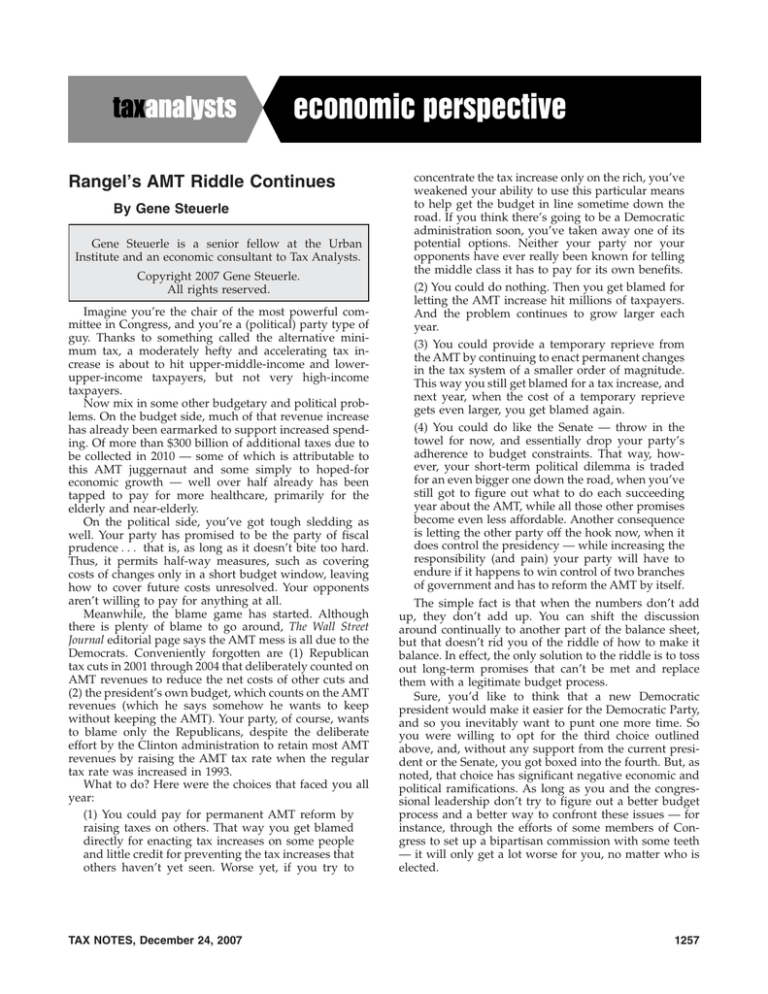
Rangel’s AMT Riddle Continues
By Gene Steuerle
Gene Steuerle is a senior fellow at the Urban
Institute and an economic consultant to Tax Analysts.
Copyright 2007 Gene Steuerle.
All rights reserved.
Imagine you’re the chair of the most powerful committee in Congress, and you’re a (political) party type of
guy. Thanks to something called the alternative minimum tax, a moderately hefty and accelerating tax increase is about to hit upper-middle-income and lowerupper-income taxpayers, but not very high-income
taxpayers.
Now mix in some other budgetary and political problems. On the budget side, much of that revenue increase
has already been earmarked to support increased spending. Of more than $300 billion of additional taxes due to
be collected in 2010 — some of which is attributable to
this AMT juggernaut and some simply to hoped-for
economic growth — well over half already has been
tapped to pay for more healthcare, primarily for the
elderly and near-elderly.
On the political side, you’ve got tough sledding as
well. Your party has promised to be the party of fiscal
prudence . . . that is, as long as it doesn’t bite too hard.
Thus, it permits half-way measures, such as covering
costs of changes only in a short budget window, leaving
how to cover future costs unresolved. Your opponents
aren’t willing to pay for anything at all.
Meanwhile, the blame game has started. Although
there is plenty of blame to go around, The Wall Street
Journal editorial page says the AMT mess is all due to the
Democrats. Conveniently forgotten are (1) Republican
tax cuts in 2001 through 2004 that deliberately counted on
AMT revenues to reduce the net costs of other cuts and
(2) the president’s own budget, which counts on the AMT
revenues (which he says somehow he wants to keep
without keeping the AMT). Your party, of course, wants
to blame only the Republicans, despite the deliberate
effort by the Clinton administration to retain most AMT
revenues by raising the AMT tax rate when the regular
tax rate was increased in 1993.
What to do? Here were the choices that faced you all
year:
(1) You could pay for permanent AMT reform by
raising taxes on others. That way you get blamed
directly for enacting tax increases on some people
and little credit for preventing the tax increases that
others haven’t yet seen. Worse yet, if you try to
TAX NOTES, December 24, 2007
concentrate the tax increase only on the rich, you’ve
weakened your ability to use this particular means
to help get the budget in line sometime down the
road. If you think there’s going to be a Democratic
administration soon, you’ve taken away one of its
potential options. Neither your party nor your
opponents have ever really been known for telling
the middle class it has to pay for its own benefits.
(2) You could do nothing. Then you get blamed for
letting the AMT increase hit millions of taxpayers.
And the problem continues to grow larger each
year.
(3) You could provide a temporary reprieve from
the AMT by continuing to enact permanent changes
in the tax system of a smaller order of magnitude.
This way you still get blamed for a tax increase, and
next year, when the cost of a temporary reprieve
gets even larger, you get blamed again.
(4) You could do like the Senate — throw in the
towel for now, and essentially drop your party’s
adherence to budget constraints. That way, however, your short-term political dilemma is traded
for an even bigger one down the road, when you’ve
still got to figure out what to do each succeeding
year about the AMT, while all those other promises
become even less affordable. Another consequence
is letting the other party off the hook now, when it
does control the presidency — while increasing the
responsibility (and pain) your party will have to
endure if it happens to win control of two branches
of government and has to reform the AMT by itself.
The simple fact is that when the numbers don’t add
up, they don’t add up. You can shift the discussion
around continually to another part of the balance sheet,
but that doesn’t rid you of the riddle of how to make it
balance. In effect, the only solution to the riddle is to toss
out long-term promises that can’t be met and replace
them with a legitimate budget process.
Sure, you’d like to think that a new Democratic
president would make it easier for the Democratic Party,
and so you inevitably want to punt one more time. So
you were willing to opt for the third choice outlined
above, and, without any support from the current president or the Senate, you got boxed into the fourth. But, as
noted, that choice has significant negative economic and
political ramifications. As long as you and the congressional leadership don’t try to figure out a better budget
process and a better way to confront these issues — for
instance, through the efforts of some members of Congress to set up a bipartisan commission with some teeth
— it will only get a lot worse for you, no matter who is
elected.
1257




